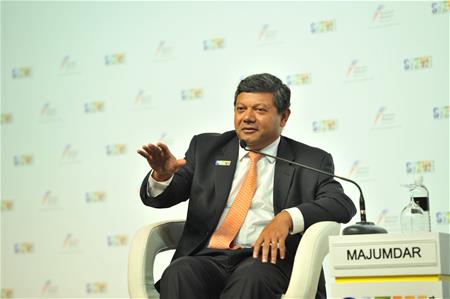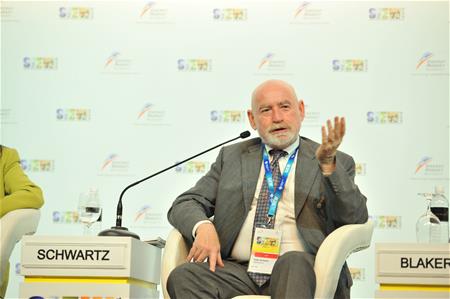
Arun Majumdar, the Jay Precourt professor at Stanford University, says a major global challenge will be connecting the billions of people worldwide with little access.

Mr Peter Schwartz, Senior Vice President for Global Government Relation and Strategic Planning at Salesforce, addresses more than 1,200 delegates during the Singapore Energy Summit.
By Lee Joo Yeow
Clean energy technology continues to improve and advances in storage will help to address the intermittent nature of generation from renewable sources, the founder and director of the Centre for Sustainable Energy Systems at Australian National University said on Monday at Singapore International Energy Week 2014.
“We have the technology for 100 percent clean energy right now,” Andrew Blaker told industry executives and government officials during a panel discussion at the Singapore Energy Summit on Energy Technologies and Sustainability.
In Australia, one-sixth of rooftops now have photovoltaic panels installed, he said.
“Australia is very likely to have 80 percent renewable electricity by 2040,” Blaker said on the first day of the 7th annual event.
Arun Majumdar, the Jay Precourt professor at Stanford University, said a major global challenge will be to connect the 1.5 billion people who now have no access to electricity and another 1.5 billion people with little access.
Blaker said the vast majority of the world’s population lives in areas with excellent access to solar and wind energy, offering potential for these billions of people to benefit from electricity generated from the two renewable sources.
Asked about the next big thing in clean power, Majumdar said current energy use is wasteful and that improvements in efficiency would provide an alternative energy source.
Peter Schwartz, senior vice president for global government relations and strategic planning at Salesforce.com, said natural biological fuels could be a source of clean energy. Small-scale nuclear power plants of 50 to 100 megawatts could be the next big thing and there is potential for nuclear fusion if research yields results, he added.
We are living through a revolution, Majumdar said.
“For the first time in 120 years, distributed generation is cheaper than centralised distribution,” he said.
Watch the full panel session here.
About Singapore International Energy Week (www.siew.gov.sg)
The 7th annual SIEW 2014 is the foremost platform for top policymakers, energy practitioners and commentators to discuss energy issues, strategies and solutions. SIEW brings together a robust line-up of world's leading conferences, exhibitions, roundtables and networking events to provide insights and perspectives on the emerging trends and innovations across the energy spectrum of oil & gas, clean and renewable energy, and energy infrastructure financing – in one week, one location. Please visit www.siew.gov.sg for further information.